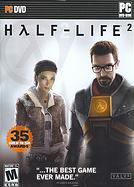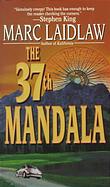Reading the text: Marc Laidlaw
Posted by Randolph Carter on June 10, 2009
 Author blog:
Author blog:
Would you mind describing what it is you do at Valve?
What I do here has changed over the years. Every game has different needs–including the amount of writing. Half-Life was the game I first worked on, and there was very little in the way of written dialog, but a great deal of working with the team to imbue the game with the feel of a narrative. With Half-Life 2 we had the ability to develop well-rounded characters, so the writing and storytelling got more complex as we tried to figure out how to merge strong characters into a first-person action game with a mute protagonist. Half-Life 2’s script that was 10 times longer than HL1’s. In the following episodes (HL2 Episode 1 and 2), the games were much shorter but also more dense–so the scripts for those rivaled the script for the full HL2. I wrote lots and lots of dialog, but only after we had figured out how to make the game itself support a strong story…so there were a lot of story design jobs that did not involve writing per se. I can’t really say much about what I’m working on now, but the writing challenges continue to be varied.
What would be a typical day for you at the office? Do you have an 8-5, M-F type schedule? Does it change when deadlines approach?
My kids go to school early, so I tend to get in somewhat early (by game industry standards) and head home around 6:30 unless there’s a crunch. When I was younger and lived closer to the office, I would come back to the office after putting the kids to bed and work late into the night. This was partly the influence of working with a bunch of 20 somethings who would work all night without blinking. Now that they all have little kids and are slogging their way through their 30’s, I’m able to slow down a bit (just in time for my 50s).
You had published novels before writing games. How did you make the transition into writing for games and was it a difficult one to make?
The last couple novels I wrote were books I’d carried around with me for many years. Once I’d written them, I didn’t immediately have another novel I needed to write. I wanted to write something set in the game industry, since I was doing game reviews and game journalism, and thought it was an interesting setting for a book. But in the process of doing my research, I fell into the sea and turned into a fish myself. Oh, wait, that was Mr. Limpet. Anyway, same deal.
Do you ever see yourself getting back into writing novels?
Sure. I’d still like to write that novel set in the game industry–the problem is that it can be less fun to write about something you know too much about. So I haven’t found quite the right tack. There are a couple novels I’ve been mulling over for years and years…so maybe I’ll eventually get to them. They should be good and stewed by now.
Would you say there is some grind in game writing? If so, what would that be?
The one we joke about most is all the lines you have to write that mean “Reloading!” Sometimes you just write “Reloading” over and over again, all the way down a page, and then it’s a job for an actor to make each reading fresh and exciting.
By contrast, what would you say is one of the most rewarding things about being a game writer?
The reason I was drawn to games was the possibility of doing something new–literally, something that has never been done before. This remains the big appeal. Although there is a great deal of derivative, stale content in the game industry, there is still plenty of room for innovation and invention–plenty of frontier. We’re constantly catching sight of new possibilities just up ahead–the chance to do things that were not even conceivable several years ago.
Kim Wilkins, one of the authors recently interviewed for this site, had this to say about the future of writing: “If you want to see the future of narrative, it’s in games. As written entertainment goes digital, I think we’ll see more and more quality writing in games. It’s going to be awesome.” Would you have anything to say to this?
I think we see more evidence of this all the time. Good writers have been in the field from the beginning, and good writers continue to emerge from within the world of games. But as the cultural currency of games continues to spread, it attracts writers from other backgrounds. This is not to say that game narratives must always depend on writing. Games, as a testbed, as a place for innovation and experimentation, also offer possibilities for narrative design that don’t have anything to do with the writer’s traditional tools. As a writer, I like working on games because I am always learning; and some of those lessons have nothing to do with narrative.
Would you mind discussing your gaming background?
My childhood was completely devoid of videogames. They didn’t exist yet. In college I frequented the arcades, of course. I had a roommate obsessed with Missile Command, while I tended to games like Tempest. That was about it for me and games for many years. It wasn’t until Myst came out that I played a computer game. That was the turning point for me, in terms of perceiving games as being comparable to novels in their ability to create new worlds and rich, atmospheric experiences. I felt like all my writing experience to that point had been preparing me for exploring this new terrain that was just opening up.
Have you ever ventured into online worlds? What was that experience like?
My first online game was Asheron’s Call. You never forget your first. It was full of menace in a way that more orderly games like World of Warcraft are not. It seemed as if even the designers themselves weren’t sure what might be around the next corner. I wrote what was essentially some AC fanfic, a story called “An Evening’s Honest Peril.” Since then I’ve dabbled in a few other online worlds and spent large amounts of time playing WoW, which is beautifully done…but I miss the nightmarish chaos of earlier days.
It appears you have a story included in the forthcoming Lovecraft inspired anthology Lovecraft Unbound. Would you mind talking a little bit about your story “Leng” and what your take on H. P. Lovecraft happens to be?
I was just another of the countless would-be writers who caught the Lovecraft bug in my youth, and I spent a great many pages imitating him…all of it miserable dreck. Eventually, as I found my own voice, I put HPL behind me…but in the last few years I’ve come back to my old haunts a few times. It’s nice to be able to do that now that I’ve learned a few tricks and I’m more confident in my own style. “Leng” was an attempt to explore areas where my own interests overlap with Lovecraft’s. Several years ago I went to Tibet with a botanist friend who leads tours that emphasize mycology (you can find more info at www.danielwinkler.com). Now I have written about Tibet several times (the novel Neon Lotus, and such stories as “The Vulture Maiden”), but all my previous stories were based on research, book-learnin’, not on first-hand experience. This time, all I had to do was open my Moleskine or cast my mind back and I could find all the odd details I needed for a story. That was really liberating!
Setting a Lovecraftian story in Tibet felt like a perfect match. Tibet’s influence on Lovecraft’s imagination is clear enough. He came up with his “Plateau of Leng” in a time when newspapers were reporting on events from the far-off, exotic Tibetan Plateau; these must have set Lovecraft dreaming. Leng figures in a few of his tales, and appears as a setting, briefly, in The Dream-Quest of Unknown Kadath, one of my very favorite novels. So when Ellen Datlow asked if I might have anything for Lovecraft Unbound, a lot of colorful elements all came together at the same time. I feel that “Leng” is the strongest serious Lovecraftian story I’ve written, and having done that, it’s time to move on. As soon as I finish the one I’m working on right now, I mean.
 What advice would you have for someone wanting to get into the field of writing for games? Would your advice be any different for aspiring authors?
What advice would you have for someone wanting to get into the field of writing for games? Would your advice be any different for aspiring authors?
Writing for games is a career move, and career advice tends to be dry and obvious: Some of it is luck, some of it is the result of persistence and application. What’s more important is not the career decision, but to do the things that help you develop as a writer. Write short stories and see if you can make them strong enough to appeal to a discerning (i.e., paying) audience. For this, you should be studying the markets for short fiction, and trying to sell your stories there. I think you can learn more about narrative structure writing a short story than writing a fat trilogy…and the lessons you learn there can be applied to longer forms, including games. Actually, I don’t know why I’m telling you this. There is already enough competition.
Is there anything else you’d like to share with this gamer/reader audience?
Here are links to three of my stories that are online, specifically the ones related to games and/or Lovecraft. All three of these appear in Rudy Rucker’s online magazine, Flurb:
- “An Evening’s Honest Peril” (my Asheron’s Call story)
- “The Hannemouth Bequest” (a Lovecraftian computer story)
- “The Vicar of R’lyeh” (Lovecraft and the games)
I wrote one other story about a game designer, “Total Conversion,” just before I joined Valve in 1997. It appeared in the August 1999 issue of The Magazine of Fantasy & Science Fiction. (Hm. It looks as if there might be a torrent of it.)
This entry was posted on June 10, 2009 at 2:23 am and is filed under Uncategorized. Tagged: Author interview, game writer, Marc Laidlaw, Reading the text. You can follow any responses to this entry through the RSS 2.0 feed. You can leave a response, or trackback from your own site.
Grinding to Valhalla Interview « Not So Few Monstrosities said
[…] blog was disabled when this interview came out, so here is a belated link. It’s one of the more enjoyable ones I’ve done in […]
Reading the text: Greg Costikyan « Grinding to Valhalla said
[…] Marc Laidlaw […]